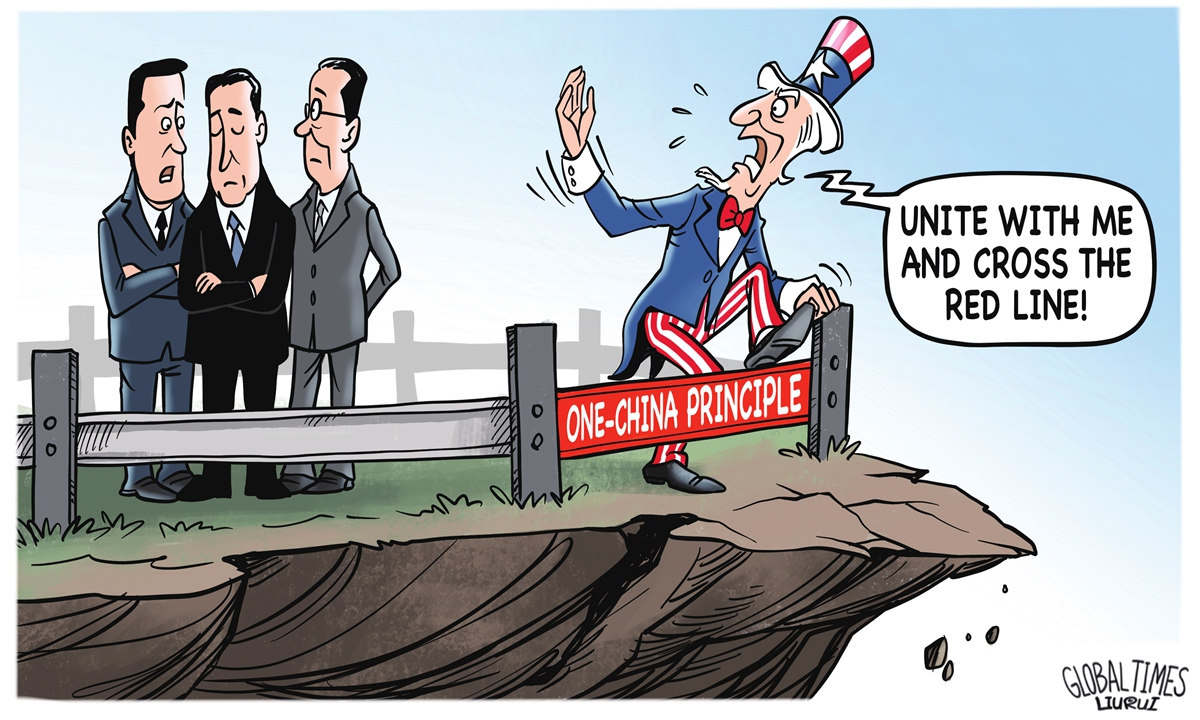
Illustration: Liu Rui/GT
In a recent interview with the Financial Times, former Malaysian prime minister Mahathir Mohamad blamed “US provocation” for increasing tensions in the Taiwan Straits, suggesting members of the Association of Southeast Asian Nations (ASEAN) stay away from the US and the West’s provocations against China. In the words of this British media outlet, he urged regional countries to “move closer to China.”
As an experienced politician, Mahathir looks at the current intensified conflict over the island of Taiwan from a compelling strategic perspective. As the US keeps instigating confrontation between the two sides of the Straits, many Southeast Asian countries have come to realize that Washington has started to play a destructive role in regional order, ruining the image it has tried to create as a “defender” and “advocator” of regional security.
Mahathir’s remarks demonstrate that some Southeast Asian politicians and observers are concerned about the regional impact of Washington’s increasing provocative activities. Previously, under the influence of Western public opinion, some countries worried more about Beijing’s “aggression” in the region. But the current situation in the Taiwan Straits proves that it is the US, not China, that has insisted on taking provocative actions, leading to more instability in the region.
In general, Southeast Asian countries pursue a strategy that seeks to maintain a balance between great powers. Take the reaction of ASEAN after US house speaker Nancy Pelosi’s provocative Taiwan visit. Some observers pointed out that even though ASEAN did not fully support China by openly condemning the US on the Taiwan question, the bloc did not give Washington what it wanted either – democracy, human rights, or a liberal international order was not mentioned in the collective statement of ASEAN members.
It does not – and will not, at least in the near future – benefit Southeast Asian countries to take sides between China and the US. Thus, they maintain a relatively neutral attitude toward the Taiwan question. It is certain that ASEAN members support the one-China principle, a universal consensus of the international community and a basic norm in international relations. And although they have not publicly expressed strong opposition to Pelosi’s visit, they have expressed concerns over provocative actions that could “destabilize the region and eventually could lead to miscalculation, serious confrontation, open conflicts and unpredictable consequences among major powers,” as a statement by ASEAN foreign ministers on the cross-Straits development said on August 3.
Even after Pelosi’s provocative trip, the US has continued to provoke the Chinese mainland on the Taiwan question, including launching a series of military drills in the Asia-Pacific region with its allies. This has heightened regional tensions and intensified the confrontation between Beijing and Washington.
Peace and stability are ASEAN’s primary concerns. Southeast Asia is an important engine of global economic growth, and chaos and instability can only hinder the region’s contribution to the world. For regional countries, they will be forced to get involved in conflicts if the US goes on with its destabilizing behavior. As a result, the US is likely to push Southeast Asian countries toward China gradually.
The US knows that what it is doing now in Southeast Asia won’t make regional countries rely more on it. Instead, these nations are wary of the problem of securitization created by Washington that blurs the focus of regional development and undermines regional development. From this perspective, while the US continues politicizing issues, regional countries are increasing their strategic vigilance against it.
Even if ASEAN is moving closer and closer to China, it is still too soon for its members to tilt completely toward China. Mahathir’s remarks are a warning to the US. If the US insists on taking its path of provoking wars and conflicts, Southeast Asian countries will definitely be forced to face the problem of taking sides in the end, and the possibility of them turning completely to China cannot be ruled out.
The article was compiled by Global Times reporter Xia Wenxin based on an interview with Xu Liping, director of the Center for Southeast Asian Studies at the Chinese Academy of Social Sciences in Beijing. opinion@globaltimes.com.cn
